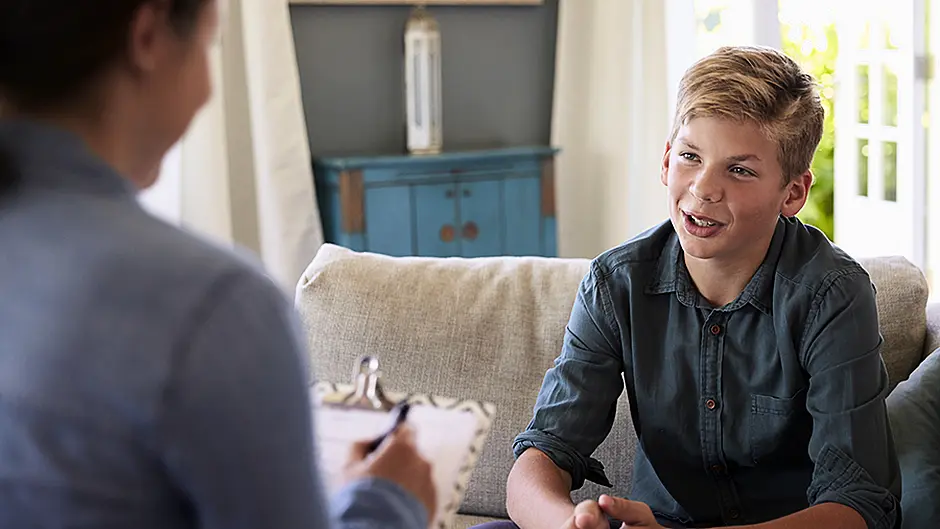Developing a good mental health during adolescence is crucial, as it impacts on so many other areas of your life at a busy time in your personal development
DEVELOPING good mental health during adolescence is crucial, as it impacts on so many other areas of your life at a busy time in your personal development, says a guidance counsellor in one of West Cork’s biggest schools.
Fiona Ronan is the guidance counsellor at Skibbereen Community School, which has a student population of over 800.
‘I would definitely see mental health as the number one health issue facing our young people at the moment. That’s why it’s so important to learn how to support good mental health at a young age, as it impacts on more or less everything – social relationships, learning and engagement at school, an ability to care for yourself and others, and making informed future life choices,’ said Fiona.
At a basic level, she encourages students to develop healthy habits. ‘Things like taking exercise, eating well, getting enough sleep, developing your interests, developing coping and problem-solving skills – this is all common sense but are habits that will determine how you function and deal with everyday life,’ she said.
School chaplain Rosie O’Brien agrees that it’s about building strength and resilience while students are feeling good – rather than waiting for a problem to arise.
Fiona said as teens move from childhood to adulthood and are working through life’s daily demands, they must realise that problems will arise and mistakes will be made.
‘As adults, we might want to jump in and fix the issue, but sometimes it can be more beneficial to listen, support and acknowledge that the young person is often quite capable of managing and dealing with the situation themselves. It’s about working through possible solutions, developing coping skills and knowing when it’s time to seek help and support.
The message she shares with her students is that: ‘Mental health is not about feeling okay all of the time, but being able to manage what life puts your way. To know that you’re not the only person having a bad day, knowing that things don’t have to be 100% perfect, not judging yourself against other people and figuring out what’s important for you, and being comfortable with that.’
This is what she, and the other counsellors, school chaplain and student support team, try to instil in their students.
But they’re still faced with troubled teens on a daily basis, struggling with everything from mild to moderate anxiety, self-harm, abuse of alcohol, self-image issues, bullying, exploring sexual identity or managing relationships with peers. ‘For younger teens, their relationship with peers has a massive influence on them. There is pressure to conform with their peers, they want to fit in, they want to be that person people want to hang around with,’ said Fiona.
West Cork-based psychotherapist Maura O’Donovan agrees that friendships and the peer group are important, particularly during adolescence. ‘Strong friendship bonds are protective of good mental health and well-being. However, toxic friendships can create and contribute to anxiety. Behaviours such as bullying and exclusion, which can be both overt and covert, can create anxiety and a sense of confusion in a young person.
‘Having other interests such as sport, music or a part-time job can help mitigate the impact of the above and contribute to the development of skills, resilience and confidence.’
Constant exposure to social media also causes problems.
Fiona said: ‘Is there ever really a time when young people get to switch off from the fast pace of life in our modern world? They’re constantly being bombarded with messages of what their life should be and their reality often doesn’t match, so there’s a sense of not measuring up, not being good enough,’ she said.
There’s also the reality that they don’t have a ‘cooling off period’ and are not switching off from social media, including the likes of WhatsApp and Snapchat.
‘Messages are coming continuously and at all hours. They’re constantly checking their phones to see what’s going on and don’t even see it as a problem but as a way of life,’ said Fiona.
Excessive drinking can also negatively impact on mental health.‘Of course that isn’t confined to adolescence but could be viewed as a societal issue for all in Ireland, regardless of age. But it’s worth noting that the brain doesn’t develop fully until the age of 24, so excessive alcohol can damage a developing brain.
‘Furthermore, binge drinking encourages risk-taking behaviour, such as sharing things on social media that you wouldn’t normally do if you were sober,’ she said.
Included in that is the sharing of sexual images which is a crime, and is an emerging problem in schools everywhere.
‘It’s very serious, not only for those whose picture is shared, but for those in possession of the images. Having to deal with the fallout has very damaging effects on everyone, and really impacts on their self-esteem,’ said Fiona.
Anxiety, she said, can range from a low level of not being able to cope socially with their peer group, feeling study or exam pressure, to far more serious feelings of depression and hopelessness.
‘It can manifest itself in so many different ways. For example, poor attendance or reluctance to attend at school, withdrawal from activities or no longer enjoying them, a deterioration in school work. For someone else it might be an unusual outburst that would be out of character.’
Fiona admitted it can be daunting for a young person when referred to their GP or more specialist services like Camhs, Jigsaw or Pieta House.
‘They have to see the value in it and realise there’s no shame involved. It can be a daunting experience for young people and that’s why it’s important that these services are accessible,’ she said.
Encouragingly, she believes young people are getting better at seeking help: ‘They are better informed when it comes to mental health and they are more open to talking about mental health than people were in the past. It’s also helpful that there are many really positive initiatives happening within schools, such as the new well-being programme for junior cycle which aims at equipping students with the skills they require to live healthy, happy lives.’
Teenagers: set your goals, be mindful and get moving
TEEN Talks, an initiative to promote positive mental health, fitness and well-being in young people in Cork, potentially helped save the life of one young male student.
That’s according to suicide survivor Graham McCormack who spoke at the event which took place in Bantry.
‘One parent messaged me after one of the events and said their daughter had been at it and when she got home she started the mental health conversation at the kitchen table which helped her son open up about how he was feeling, which possibly saved his life,’ he said.
Graham (30) from Douglas in the city shared his compelling story with TY students at the events.
His mental health challenges started when he was only seven when he started self-harming as a result of being severely bullied in school.
Aged 11, he started taking drugs and at 12 he was using alcohol. In the years that followed he spent time in rehab, in psychiatric wards, living on the streets, but then turning his life around and becoming an MMA fighter – only to lapse again and make several suicide attempts.
When he finally got the strength to get his life on track, he shared his story on social media where he said the response was phenomenal.
He has since appeared on the Late Late Show, Nationwide and spoken in the Dáil.
However, he said he has never been part of anything as big or powerful as Teen Talks, which is a County Council initiative.
‘I genuinely feel sorry for teens today. A lot of them are self-harming; anxiety is through the roof; lots of them feel directionless and hopeless,’ he said.
His advice is for parents and guardians to ‘back off a bit.’
‘You can’t control another person’s experience, you can only gently guide but not control them.
Mental health is something that’s thrown at them every two seconds – it’s really in their face. I’m a big believer in lightening up a bit when it comes to mental health – have some fun and be real, raw and honest.’
He also stressed the importance of goal setting for teens, being mindful and moving.
‘I also tell them that I still have my off days and that imperfection is perfection. We all have flaws, we all get upset, that’s part of human nature. It’s about being prepared for that and not being naive.’
Niall O’Callaghan, healthy Ireland co-ordinator at Cork County Council, pointed out that Teen Talks had the support of Pieta House counselling services.
‘Students availed of this at all of our three locations. These might have been people, not at crisis point, but more of an early intervention,’ he said.
Teen Talks will run again next year, subject to funding.








